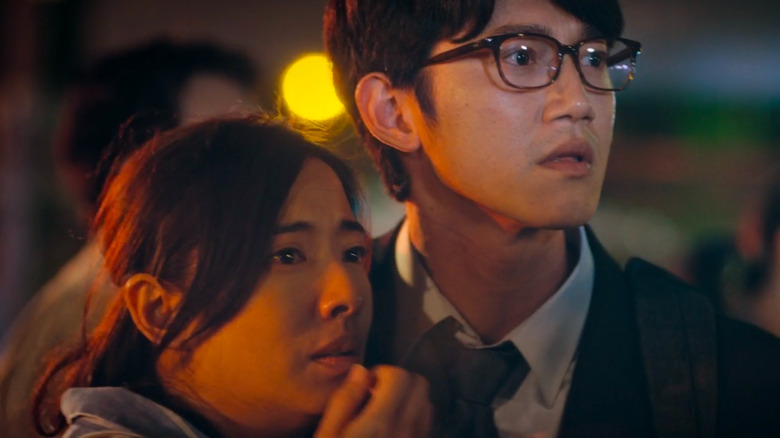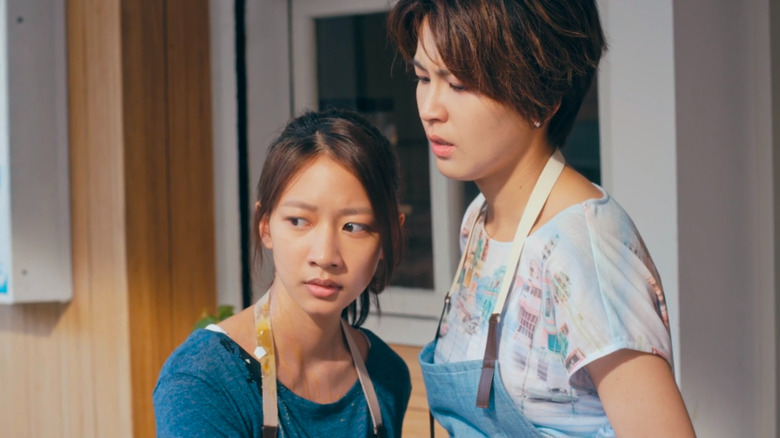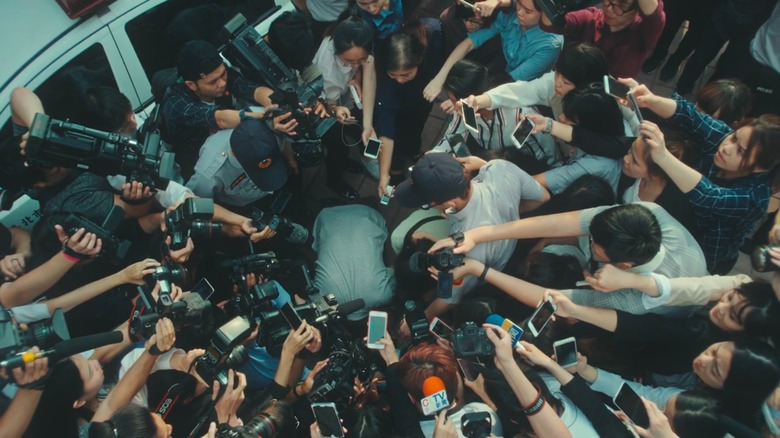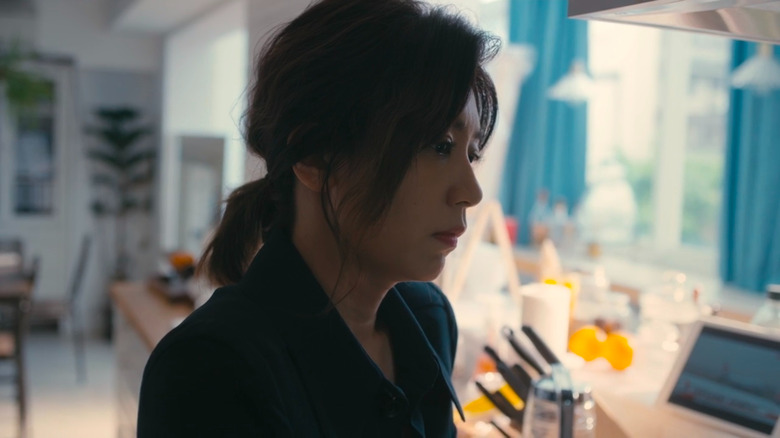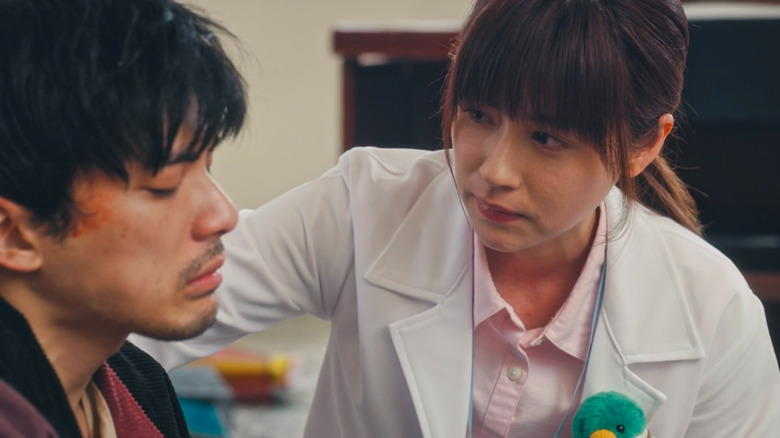The Daily Stream: The World Between Us Measures The Distance Between Ourselves And Evil
(Welcome to The Daily Stream, an ongoing series in which the /Film team shares what they've been watching, why it's worth checking out, and where you can stream it.)
The Series: "The World Between Us"
Where You Can Stream It: HBO Max
The Pitch: Two years after an infamous movie theater shooting, ordinary people grapple with the aftermath of the violence. Li Hsiao-wen, the sister of the shooter Li Hsiao-ming, changed her name to Li Ta-chih to avoid public abuse. Her overworked boss, Sung Chiao-an, is tormented by the death of her son in the shooting. She turns to drink and lashes out at her husband and daughter. Meanwhile, Hsiao-ming's defense lawyer Wang She fights to uncover the truth of his client's actions so as to rectify the systemic problems that create shootings in the first place. His willingness to defend society's outcasts confuses his wife, who is still reeling from an incident at their daughter's school involving a man with schizophrenia. This man, Ying Szu-tsung, is the brother of Tai-chih's landlord Ying Szu-yueh, who must now balance her upcoming wedding with family illness.
Do Ta-chih and her parents deserve to be punished for Hsiao Ming's actions? How can a principled lawyer like Wang She defend a killer like Hsiao Ming? Is Chiao An or her husband, Liu Chao-kuo, responsible for destroying their marriage? Is there a future for Ying Szu-tsung when Taiwan fails to adequately support patients with mental illness? Not to mention: is it possible to do good journalism when the media landscape rewards sensationalism? Why does Taiwan still have the death penalty? What could a fairer system of restitution look like? All this and more in the award-winning drama "The World Between Us."
Why it's essential viewing
While the Taiwanese horror industry is booming, and international exports like Ang Lee span genres, the most successful Taiwanese dramas have traditionally been romances. 2001's "Meteor Garden," an adaptation of the Japanese manga "Boys Over Flowers," was so popular that it spawned a boy band starring the show's "Four Flowers." 2009's "Autumn Concerto" earned a devoted following in its day for its earnest tale of true love triumphing over memory loss. 2019's "Someday or One Day" married a surprising and suspenseful time travel plot with a delicate meditation on grief, love, and nostalgia. These shows were all important in their own right, but also exist within the constraints of the genre: young love, difficult mothers-in-law, shocking twists and turns. They are fantasy stories, not works of social realism. This doesn't diminish their power, but does set limits on what they can contain.
Scriptwriter Lu Shih-yuan decided to do something different. She took inspiration from the Little Light Bulb incident in 2016, an infamous crime in which a man with schizophrenia decapitated a four-year-old girl in the street. The people of Taiwan cried for his death, but the young girl's mother resisted. She argued that because her daughter's killer was unwell, he should be spared the death penalty. Lu thought carefully about what this crime revealed about Taiwan's strict criminal justice system, sensationalized media ecosystem, and underfunded mental health networks. She thought carefully about humanity's willingness to condemn outsiders, and its capacity to forgive. These themes became the focus of the TV series "The World Between Us."
All beings are sick
"The World Between Us" begins with a shooting in a Taiwanese movie theater. It then extrapolates outward, imagining how this singular incident affected the people of Taiwan. We see distraught parents and wounded survivors. We learn how the media milks the shooting for stories and how fearful city-dwellers are inspired by these stories to fear people with mental illness as well as psychiatric hospitals. We even meet the family of the shooter, who are held responsible for his actions despite their best efforts to apologize and atone. The series utilizes handheld camera footage and diegetic viral media to ground its story in reality, as well as evoke the speed at which stories grow and change on television and the internet.
The show's subject matter and sense of realism makes it a tough watch at the best of times. "It's a very difficult drama to look at," says the YouTuber AvenueX, "because it talks about things that are very difficult." "The World Between Us" features its share of romantic drama tropes, such as villainous mothers-in-law, romantic entanglements, and medical emergencies. But the true villains are systemic, and are far too powerful for our heroes to manage alone, much less defeat. Every character in "The World Between Us," no matter their backgrounds or beliefs, is marked by the violence inflicted by these overlapping systems on themselves, their family, and their friends.
Queen of drama
The most memorable character in the series is without a doubt Sung Chiao-an, played by "Queen of Drama" Alyssa Chia. She's a hardworking media executive who punishes her staff when they fail to match her pace. Her network prioritizes sensationalist coverage rather than responsible reporting, but only because to do otherwise might upset the viewing audience as well as the company's shareholders. Chiao An neglects her daughter and argues with her husband. Over the course of the series, she confronts her grief and emerges as a better person. But "The World Between Us" refuses to let her off the hook. Quitting drinking means grappling with withdrawal symptoms. Accepting the death of her son means overcoming her own deep guilt. Through it all, Chia keeps finding new sides to the character. She's charismatic, terrifying, pathetic, and relatable, sometimes all at once.
Another key character, the defense lawyer Wang She, is less nuanced than Chiao-an. But he's just as important to the show's larger themes. As played by Wu Kang-ren, he is introduced when a man douses him in a bucket of feces. People can't understand why Wang defends murderers, outcasts, and the mentally ill. Only Wang She recognizes that folks like Li Hsiao-ming are the fault of systemic problems rather than humanity's capacity for evil. While he isn't an abolitionist (he says that Hsiao-ming "deserves to die"), he at least values reparation over punishment. Wang She works hard to find common ground between the cast, and is the closest the series has to a moral center. But even he is tested in the show's final episodes. The show's Chinese title, after all, is "The Distance Between Ourselves and Evil."
Look into the future
Despite its difficult content, "The World Between Us" became a smash hit on its release in 2019. Its last two episodes attracted 4 million viewers on its local streaming service Catch Play. Per Taiwan's Public Television Service, quoted by the Taipei Times, "only the highest-rated TV dramas generally reach such heights." The series won several Golden Bell awards, including Best Actress, Best Director, and Best Screenplay for a Drama Series. It even has a user rating of 9.5 on Douban, a popular Chinese database and social network. Audiences from the mainland connected with the show's moral quandaries, its social critique, and its depiction of government and media corruption. All this despite the fact that, per Cinema Escapist, "a show like 'The World Between Us' [...] would probably never get made in mainland China."
"The World Between Us" isn't perfectly realistic. Some scenes are a little too loud or broad, a remnant of Taiwan's history of romantic dramas. The side characters lack the nuance of the main cast. The show's efforts to pull every plot point and character together at the end can be contrived. But I admire how willing the series is to depict experiences that the majority of television avoids. As an anime fan, I've long been frustrated by the medium's refusal to acknowledge the reality of mental illness in a meaningful way despite the number of stories that draw from those experiences. "The World Between Us" doesn't just put mental illness at the center of its narrative, but suggests that living with it (with the help of medication and a support network) is feasible without minimizing the challenges that come with it. For this reason and more, the series deserves its reputation as a modern classic.
